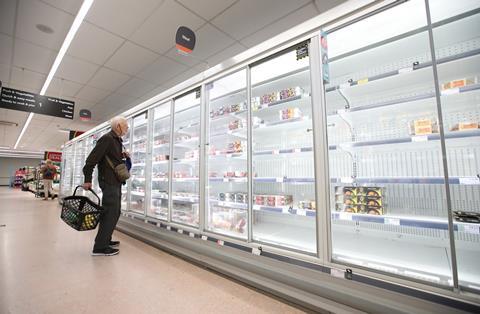It’s difficult to accept that we’re not in control of our own lives, says Tim Farron. But if our hope is in Jesus, we can find peace

Panic buying at the petrol pumps brings back memories of the great toilet roll stampede of 2020… But is it a sign of selfish behaviour, making sure I’m all right at your expense? Perhaps, but it’s surely a sign of the anxiety that blankets our world at the moment as well. After 18 months of pandemic, we are feeling shaky and insecure. The line between precaution and panic becomes very thin. Our confidence that we are in control of our own destinies seems sure… until it becomes apparent that we’re not!
Not in control
We might blame the government, Brexit, oil companies, Covid, the way that our ‘just in time’ supply chains are organised… but whatever the cause, it is extremely humbling: We spend our lives building what we think is security – whether in possessions, money in the bank, relationships, a home with a door that we can close on the world – but ultimately we discover that we cannot be sure of what tomorrow will bring and have no power to make it so.
Jesus himself faced death, and knows what it is to experience fear
In James’ letter to fellow first-century Christians, the Bible, with characteristic bluntness, puts it like this: “Now listen, you who say, ’Today or tomorrow we will go to this or that city, spend a year there, carry on business and make money.’ Why, you do not even know what will happen tomorrow. What is your life? You are a mist that appears for a little while and then vanishes.” (James 4:13-14).
How difficult it is to accept that we are ultimately not in control of our lives, and to find a kind of peace in that realisation. At its core, our anxiety is driven by our fear of death. When life ticks along, we can pretend that we are in charge of our destinies. We know that life is short but we don’t want to engage with that thought. Then, and when something major comes along (like Covid) we are forced to fall back on our inner resources. But what resources do we have? Where do we place our hope at a time like this?
Exposing our nature
At the start of the pandemic, the Christian speaker J.John wrote that our current mood exposes the nature of our morality – what we think and do about right and wrong. Our morality can be profound – coming from deep convictions inside us – or it can be superficial because it is based on social conventions; a veneer of behaviour that disintegrates in the presence of fear.
In parts of the world where people live alongside disease, death and uncertainty much more closely than we do, faith and spirituality tend to play a bigger part in people’s lives. Here, we have the palliative of cosy Western lives to con us that we don’t need any of that God stuff.
Realigning our lives
But faith in Christ is not a crutch for a broken leg; something to hold us up when we need it and to be cast away when we can once again cope with life. It is a realignment of our attitudes, a deep spiritual recognition that we are not our own saviours and that we do not control the universe. We do not have to rely on ourselves for meaning, love and redemption. Instead Christians believe we are so loved that the one who does control the universe gave his life to enable us to live ours to the full – and to free us from the fear of death that stalks our world.
Our current mood exposes the nature of our morality
Yet this is all so far outside our society’s shared cultural understanding that it is seen as out of touch and frankly bizarre. A recent Daily Express headline bellowed: 'End of the world: is coronavirus the prophesied plague in the Book of Revelation?’ It quoted some random people on Twitter who believe that the virus is one of the four horsemen of the apocalypse, and then filed the story under the heading ‘weird’.
Admittedly Revelation, with its colourful imagery and obscure prophecies, is probably not the place to start to explore the richness of the Bible. If you want to find out more about the faith that is followed by two billion people around the world, maybe try one of the four Gospels, Matthew, Mark, Luke or John, instead.
A better story
If you do, there you will find the story of Jesus’ life - and death. In it, Jesus makes some pretty bold claims. He tells us that he has come to offer us life to the full; that he has overcome the fears and troubles of the world; that he will give us his peace as we walk through life’s trials. Crucially, he does not tell us that we will avoid those trials. He himself faced death, and knows what it is to experience that fear.
Most of all, he offers a hope that one day there will be no more death, sorrow or pain. One day the whole of creation will be renewed and restored and he invites us to share in that hope.
So, as you sit in the queue for petrol, you are being offered something that will never run out. Hope and peace. There is nothing vague about Jesus’ claims - they are stark and unmistakable. They are however, uncomfortable, because he’s telling you that you aren’t in charge of you. But then again, maybe you already knew that but were too scared to admit it because … what then?
Well, the ‘what then’ is that there isn’t chaos, there is someone in charge. And he loves you so much that he died for you. Sounds ridiculous? Well, as we are forced to reassess what really matters in our lives - when everything we take for granted threatens to be stripped away - surely these claims, and the awesome promises that come with them, are worth a second glance?




































